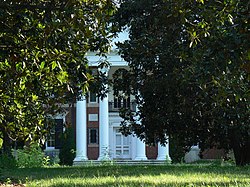Douglas Southall Freeman
[1] In 1911, when Freeman was 25 years old, he came into possession of a cache of long-lost wartime communications between Robert E. Lee and Confederate president Jefferson Davis.For example, the letters reveal that the Confederate high command in 1862 considered but rejected a bold proposal to strengthen Stonewall Jackson's army in the Shenandoah Valley and embark on a vigorous offensive campaign against the North, even at the expense of defending Richmond.He evaluated and cataloged every item about Lee, and he reviewed records at West Point and the War Department and material in private collections.[6] Lee's Lieutenants: A Study in Command established Freeman as the preeminent military historian in the country, and led to close friendships with United States generals George C. Marshall and Dwight D.[1] After completing his exhaustive studies of Lee, his generals, and the Confederate war effort, Freeman started work on a seven volume biography of George Washington.Applying the same approach of exhaustive research and writing narrative based on objective fact, Freeman completed the first two volumes, titled Young Washington, in 1948.He must have written close to 600,000 words a year, campaigned for the Federal Reserve Act, for abolition of the old City Administration Board, for repeal of the fee system, for establishment of the battlefield parks, for Richmond's new charter ...He believed in the importance of continuity, even in personal geography, once writing, "I think the American people lose a large part of the joy of life because they do not live for generations in the same place.Mary Tyler Freeman married Leslie Cheek, Jr., longtime director of the Virginia Museum of Fine Arts, and became a founder or influential officer of several important community organizations, as well as president of the Robert E. Lee Memorial Foundation.[12] The family lived (and Freeman died) in a mansion he named Westbourne in Richmond's west end, a house listed (in 2000) in the National Register of Historic Places.[15] Military commanders such as Admiral Chester W. Nimitz and Generals George C. Marshall, Douglas MacArthur, and Dwight D. Eisenhower sought his friendship and advice.[17] Charles B. Dew wrote that Freeman's "magisterial" Lee's Lieutenants, United Daughters of the Confederacy magazine, and Facts the Historians Leave Out: A Youth's Confederate Primer by John S. Tilley were crucial titles in his adolescent indoctrination into the mainstream white Southern worldview of the 1950s.

Lynchburg, VirginiaRichmond, VirginiaNewspaper editorRichmond CollegeJohns Hopkins UniversityRobert E. LeeGeorge WashingtonPulitzer PrizesArmy of Northern VirginiaConfederateJubal Earlymonument commemoration movementJ.E.B. StuartThomas "Stonewall" JacksonPhi Gamma DeltahistoryBaltimoreRichmond Times-DispatchThe Richmond News LeaderJefferson DavisStonewall JacksonShenandoah ValleyCharles Scribner's Sonsfog of warDumas MalonePulitzer PrizeLost CauseLee's Lieutenants: A Study in CommandGeorge C. MarshallDwight D. EisenhowerJohn Alexander CarrollMary Wells AshworthJohn E. FerlingWorld War IWorld War IIByrd OrganizationHarry F. ByrdFederal Reserve ActColumbia UniversityUnited States Army War CollegeRectorUniversity of RichmondRobert E. Lee's monumentMonument AvenueJoseph HaydnWestbourneNational Register of Historic PlacesHollywood CemeteryFranklin Delano RooseveltChester W. NimitzDouglas MacArthurEric FonerhagiographyCharles B. DewUnited Daughters of the ConfederacyDouglas S. Freeman High SchoolHenrico CountyWayback MachineNewspapers.comFind a GravePulitzer Prize for Biography or AutobiographyHarvey CushingEmory HollowayCharles Edward RussellBurton J. HendrickMarquis JamesHenry JamesHenry F. PringleAllan NevinsTyler DennettRalph Barton PerryOdell ShepardCarl Van DorenRay Stannard BakerOla Elizabeth WinslowForrest WilsonSamuel Eliot MorisonCarleton MabeeRussel Blaine NyeLinnie Marsh WolfeWilliam Allen WhiteMargaret ClappRobert E. SherwoodSamuel Flagg BemisMargaret Louise CoitMerlo J. PuseyDavid J. MaysCharles A. LindberghWilliam S. WhiteTalbot Faulkner HamlinJohn F. KennedyArthur WalworthDavid DonaldLeon EdelWalter Jackson BateErnest SamuelsArthur M. Schlesinger Jr.Justin KaplanGeorge Frost KennanBenjamin Lawrence ReidThomas Harry WilliamsLawrance ThompsonJoseph P. LashW. A. SwanbergLouis SheafferRobert Caro